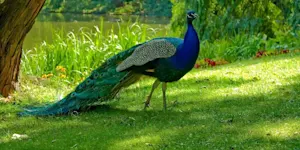What Makes This Word Tick
Myrrh is a curious word that conjures up images of ancient times; it's more than just a biblical footnote. Known since antiquity, myrrh is a resinous substance gathered from thorny trees in the Commiphora family. This aromatic material has been used in perfumes, incense, and embalming over centuries, adding a rich, earthy depth to its otherwise small, scrabble-friendly form.
If Myrrh Were a Person…
Myrrh would likely be an enigmatic elder with a mysterious past. Someone who smells faintly of exotic spices, carrying with them a timeless wisdom. They'd be the storyteller of rare tales, a mix of herbalist and historian, charming listeners with tales of their travels across distant lands.
How This Word Has Changed Over Time
Myrrh hasn't changed much over the millennia; it has retained its aromatic allure and mystical associations. While once a major player in trade amongst ancient civilizations, myrrh's presence is now largely in cultural references and specialized products.
Old Sayings and Proverbs That Use Myrrh
While there aren't exactly proverbs centered on myrrh, it is often mentioned as part of the trio of gifts — gold, frankincense, and myrrh — symbolizing things of value given in reverence and respect. Think of it as the cherry on top of ancient gifting rituals.
Surprising Facts About Myrrh
Did you know that myrrh was once used as a painkiller? Ancient cultures chewed it to relieve tooth pain or make a tea to soothe an upset stomach. Also, in ancient Egypt, it was a key ingredient in the embalming process, chosen for its preserving properties.
Out and About With This Word
You won't stumble upon myrrh at your average neighborhood corner store. But in specialty shops, particularly those with an interest in alternative medicine or ancient history, you might find myrrh in various forms, from essential oils to incense.
Pop Culture Moments Where Myrrh Was Used
Myrrh doesn’t often make a splash in pop culture. However, it does feature prominently in nativity scenes during the holiday season, often leading to a few chuckles about its modern-day relevance — perhaps as a Christmas trivia question!
The Word in Literature
Myrrh's mention is like a whisper, found amidst ancient texts and historical novels that give life to its fragrant qualities. Dawning the pages of biblical stories and adventure tales, myrrh adds an earthy authenticity that speaks to sacred and storied traditions.
Moments in History with Myrrh
When Julius Caesar defeated Pompey, it's said he celebrated with myrrh incense. Such historical tidbits highlight myrrh's past importance as a luxurious item, appreciated not just for its scent but its status-symbol significance in elite circles.
This Word Around the World
While "myrrh" remains fairly consistent in English, translations like "muir" in Irish or "mirra" in Italian keep its essence. Across various cultures, myrrh maintains a connection to historical and religious practices, showing up in Eastern medicine practices and Western folklore.
Where Does It Come From?
Myrrh is primarily harvested in regions such as Somalia, Ethiopia, and parts of the Middle East. Its source, the Commiphora tree, exudes this balsamic substance, collected after workers make incisions in the tree's bark.
How People Misuse This Word
One common misuse of myrrh might be in reference to its state; some assume it's like oil or powder when it's actually a resin. Another mix-up is thinking of it purely as a spice, overlooking its historical significance and broader uses.
Words It’s Often Confused With
Frankincense: Often paired with myrrh in historical texts, these are both resins but from different trees.
Gold: Part of the famous trio, mistaken in context more than actual confusion.
Murky: Confusion here tends to be auditory, rather than conceptual.
Additional Synonyms and Antonyms
Myrrh doesn't have direct synonyms due to its specific nature, but you might consider words like resin or incense for closely related contexts. Antonyms, given its aromatic nature, could loosely include odorless or unscented.
Want to Try It Out in a Sentence?
The sweet yet earthy aroma of myrrh filled the air, transporting everyone back to a time of pharaohs and philosophers, when stories were told around flickering candlelight.
















